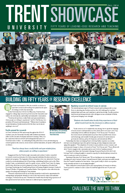
 |
 Preserving Indigenous Languages – Empowering a People
When a series of suicides rocked her small community on Manitoulin Island, Dr. Shirley Williams ‘79 had an epiphany, leading her to realize what her life’s work would be. Professor Williams, now professor emeritus in Trent University’s Indigenous Studies department, experienced first-hand the alienation of being cut off from her community and being forced to deny her language and culture, when she was placed in the residential school system as a ten-year old girl. She never forgot her father’s parting words to both “remember who she is” and to “remember her language,” and has spent much of her career working to preserve and revitalize her mother tongue from the Wikwemikong First Nation. “My mother used to say: ‘What are you going to tell the creator when you leave this world and answer him what have you done for your community?’” Prof. Williams said. “I thought, ‘If I know my own language and culture, I can contribute.’ Thereafter, everything led to language.” Incorporating the student voice After completing a B.A. in Indigenous Studies at Trent University and a Native Language Instructors diploma from Lakehead University, she was hired in 1986 by Trent as an Ojibway language teacher. The first Indigenous person in Canada to achieve the rank of full professor based on her traditional knowledge, Prof. Williams continues to engage in ground-breaking research and development in the field of knowledge preservation. “I started from scratch,” she recalls. In keeping with her traditional learning, she turned to the students to develop her curriculum through collaboration. “The Nishinaabe do not say, ‘This is what you must learn,’” she explains. “We ask: ‘What is it you would like to learn?’” Building on research she began in 1986, Prof. Williams created the Revitalization of the Nishinaabemwin Language Project to develop much-needed educational resources, including a dictionary, textbooks and an interactive language instruction program – all in Nishinaabemwin. Prof. Williams believes that written materials play an essential role in the revitalization of the language and, through it, the culture, particularly for those who lost their language through their residential school experiences. Reflecting on over a quartercentury of work, Prof. Williams is proud to have been a part of preserving her language, and grateful that she never lost the language that has been so central to her life. “All these re-creative activities reflect the revitalization of Ojibway Nishinaabemwin thought and language, the rebirth of our cultural identity as a people,” she said. “Putting these into practice is equivalent to regaining our voice, recovering ourselves, reclaiming our landscape, and re-imagining our place in the cosmos.” |

































